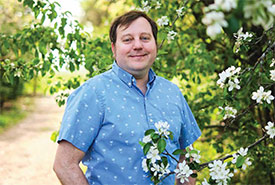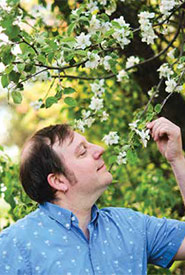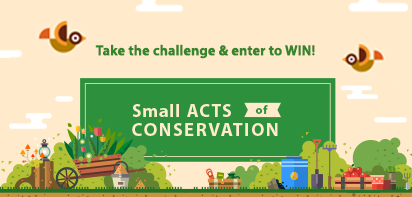Pathway to happiness

John Zelenski (Photo by Jessica Deeks)
John Zelenski studies happiness by profession. He and his research team are unravelling how our connection to nature is linked to happiness and environmentally sustainable behaviours
Zelenski’s research has found that living near green space or water tends to make people happier, resulting in higher satisfaction about where they live, and even making them physically healthier. Nature relatedness, defined by how connected someone is to nature, influences a person’s attitudes toward the environment and subsequent behaviours. If a person is more connected to nature, for example, they are more likely to donate to an environmental organization or make more sustainable decisions. People with a higher nature relatedness tend to be happier, too. Quantitative research like Zelenski’s makes it easier for policy makers to devote resources to protecting nature.
“We did a study of children in Grades 4 to 6, where we took them on two field trips on two separate days. We found that children who spent the day exploring a forest school (versus an aviation museum) felt a connection to nature that seemed to translate to empathy toward nature and animals, a desire to protect nature more, as well as more cooperative and pro-social behaviours.”
When asked whether his findings ring true in his own life, Zelenski recalls his childhood in Wisconsin, where he lived near a river, and where he had the freedom to explore at a young age. “We used to take a family vacation to northern Wisconsin, and I would spend hours leaning over the edge of a dock to tempt crayfish out of the rocks to get a better look at them,” he chuckles.
Since those early days, Zelenski has kindled an interest in birding. “About 10 years ago, when I thought I was about to become a middle-aged guy, birding seemed like a nice hobby,” he explains. “I started by putting a feeder out. I began by learning to identify chickadees, then cardinals, nuthatches…It’s a great example of how you can build up your connection to nature by starting small,” he explains.

John Zelenski in his happy place (Photo by Jessica Deeks)
“I don’t know if this works for everyone, but when you get a little taste [of nature], you learn a few things and want a little bit more,” he reflects. His advice for anyone wishing to foster their own nature relatedness is to start noticing the nature around you, whether at a park, a garden or the curb strips. Paying attention to nature in a thoughtful way can offer remarkably immediate results. “Sometimes it’s just the matter of seeing, or hearing, even smelling, nature and thinking, ‘isn’t it wonderful?’” he adds.
Ipsos conducted a poll on behalf of NCC in late 2020 that revealed that 94 per cent of people credit nature with helping them relieve the stress and anxiety of the pandemic. More than 85 per cent of respondents said access to nature has been important to maintaining their mental health. Zelenski’s research may give us insight into understanding why people feel this way.
But is nature a happy pathway to sustainability? That’s a question that Zelenski and his team wish to answer. He and his lab have been partnering with a not-for-profit organization on a new project. Participants are asked to test the water of nearby waterbodies and then upload their observations on visibility, temperature, pH, etc. to an online platform. The idea is to encourage people to get out into nature and foster a sense of contribution to citizen science, to see whether this makes people feel closer to nature, happier and more interested in doing more for nature. Zelenski says the jury is still out on this study, but the findings could show that the cycle can begin by helping nature. “We want to see if asking people to do something nice for nature in turn helps them become happy. Just as helping others usually brings about feelings of happiness and fulfillment, helping nature may boost happiness and produce nature-positive attitudes.
This story originally appeared in the summer 2021 issue of the Nature Conservancy of Canada Magazine. To learn more about how you can receive the magazine, click here.
Explore additional content from our summer issue here >



